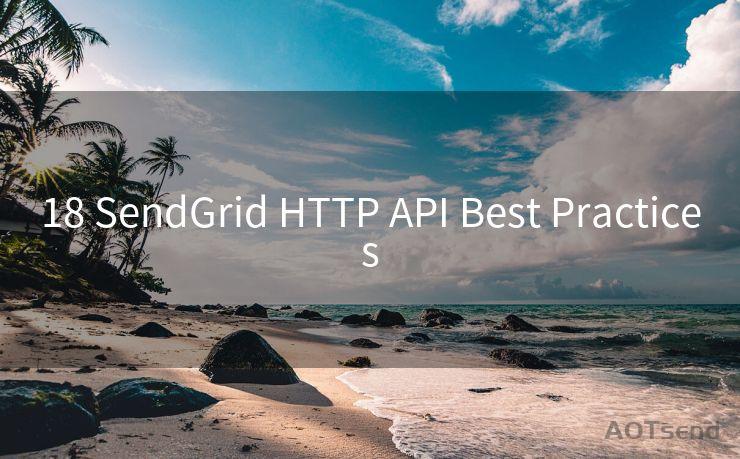18 SendGrid HTTP API Best Practices




When it comes to email delivery, using the SendGrid HTTP API is a popular choice for developers. However, to ensure optimal performance and avoid common pitfalls, it's essential to follow best practices. In this article, we'll explore 18 key best practices for using the SendGrid HTTP API effectively.
1. Authenticate Your API Requests
Always authenticate your API requests using SendGrid's API keys. This ensures that your requests are secure and can be properly tracked and managed.
2. Use the Correct API Endpoint
Make sure you're using the correct API endpoint for your requests. SendGrid has specific endpoints for different functionalities, such as sending emails, managing contacts, and retrieving statistics.
3. Validate Your Email Addresses
Before sending emails, validate the email addresses in your list. This helps reduce bounce rates and improve the overall deliverability of your emails.
4. Follow Email Best Practices
Adhere to email best practices, such as using a clear and concise subject line, avoiding spammy words, and including a text version of your email along with the HTML version.
5. Handle API Rate Limits
Be aware of SendGrid's API rate limits and adjust your sending frequency accordingly. Exceeding these limits can result in your account being throttled or suspended.
6. Monitor Your Email Delivery
Regularly monitor your email delivery metrics, such as open rates, click-through rates, and bounce rates. This helps you identify and address any issues promptly.
7. Use Webhooks for Real-Time Updates
Utilize SendGrid's webhook functionality to receive real-time updates on the status of your emails. This allows you to take immediate action if necessary.
8. Optimize Your Email Content
Ensure that your email content is optimized for mobile devices and different email clients. Test your emails across various platforms to ensure compatibility and readability.
9. Implement Retry Logic
When sending emails, implement retry logic to handle temporary failures. This increases the likelihood of successful delivery.
10. Protect Your API Keys
Keep your API keys secure and don't share them with unauthorized individuals. Consider using environment variables or a secure key management system to store your keys.
11. Utilize SendGrid's Support Resources
If you encounter any issues with the API, take advantage of SendGrid's support resources, including their documentation, forums, and support team.
12. Stay Up to Date with API Changes
Keep up to date with any changes or updates to the SendGrid API. Subscribe to their newsletters or follow their social media accounts for the latest announcements.

13. Test in a Sandbox Environment
Before going live, test your email delivery in a sandbox environment. This allows you to identify and fix any potential issues without affecting your production environment.
14. Use Personalization Tags
Utilize SendGrid's personalization tags to customize your emails and improve engagement. These tags allow you to insert dynamic content based on recipient data.
15. Implement Unsubscribe Options
🔔🔔🔔
【AOTsend Email API】:AOTsend is a Managed Email Service for sending transactional emails. Support Email Types: reminders, authentication, confirmations, notifications, verification codes, invoices, password resets, account activations, billing statements, two-factor authentication (2FA), and one-time passwords (OTP) emails, etc. $0.28 per 1000 Emails. 99% Delivery, 98% Inbox Rate.
You might be interested in:
Why did we start the AOTsend project, Brand Story?
What is a Managed Email API, How it Works?
Best 25+ Email Marketing Platforms (Authority,Keywords&Traffic Comparison)
Best 24+ Email Marketing Service (Price, Pros&Cons Comparison)
Email APIs vs SMTP: How they Works, Any Difference?
Include an unsubscribe option in your emails to comply with email marketing regulations and respect user preferences.
16. Handle Bounces and Complaints
Monitor and handle bounces and complaints promptly. Use SendGrid's bounce and complaint tracking features to identify and address these issues.
17. Optimize Your Sending Strategy
Develop a sending strategy that balances the frequency and volume of your emails. Avoid sending too many emails too frequently, which can lead to recipient fatigue and unsubscribes.
18. Leverage Analytics and Reporting
Take advantage of SendGrid's analytics and reporting features to gain insights into your email performance. Use these data to refine your email strategy and improve results.
By following these 18 best practices, you can ensure effective email delivery using the SendGrid HTTP API. Remember to stay up to date with API changes, monitor your email performance regularly, and utilize SendGrid's support resources for assistance when needed.




Scan the QR code to access on your mobile device.
Copyright notice: This article is published by AotSend. Reproduction requires attribution.
Article Link:https://www.mailwot.com/p2176.html



